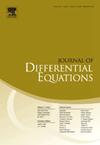Minimal P-cyclic periodic brake orbits in semi-positive Hamiltonian system
IF 2.4
2区 数学
Q1 MATHEMATICS
引用次数: 0
Abstract
In this paper, the authors study the minimal period problems for brake orbits in two types of first order Hamiltonian systems in , namely the superquadratic type and asymptotically linear type. In both cases the Hamiltonian systems are assumed to be reversible, semi-positive, and symmetric with respect to certain orthogonal symplectic linear transformation P generating a p-order cyclic subgroup acting freely on . The authors prove that if and for each , then for each there exists a pT-periodic P-cyclic brake orbit with minimal period belonging to an finite set with the form for both cases, which is an generalization of the results in [10]. The main tools involved are the iteration inequalities for Maslov-type indices, the saddle point reduction method and the Galerkin approximation method under the corresponding Lagrangian boundary condition.
半正向哈密顿系统中的最小 P 循环周期性制动轨道
在本文中,作者研究了 R2n 中两类一阶哈密顿系统制动轨道的最小周期问题,即超二次型和渐近线性型。在这两种情况下,哈密顿系统都被假定为可逆的、半正的和对称的,相对于某些正交交映线性变换 P,产生一个自由作用于 R2n∖{0} 的 p 阶循环子群。作者证明,如果 P=R(θ1)⋄...⋄R(θn),且θi∈[0,π]为每个 1≤i≤n,那么对于每个 T>0,存在一个具有最小周期的 pT 周期 P 循环制动轨道,属于一个有限集,其形式为{pTlp+q:l,q∈Z,0≤l≤n+1,gcd(q,p)=1,1≤q≤p-1},这是对 [10] 中结果的概括。所涉及的主要工具是马斯洛夫指数迭代不等式、鞍点还原法和相应拉格朗日边界条件下的伽勒金近似法。
本文章由计算机程序翻译,如有差异,请以英文原文为准。
求助全文
约1分钟内获得全文
求助全文
来源期刊
CiteScore
4.40
自引率
8.30%
发文量
543
审稿时长
9 months
期刊介绍:
The Journal of Differential Equations is concerned with the theory and the application of differential equations. The articles published are addressed not only to mathematicians but also to those engineers, physicists, and other scientists for whom differential equations are valuable research tools.
Research Areas Include:
• Mathematical control theory
• Ordinary differential equations
• Partial differential equations
• Stochastic differential equations
• Topological dynamics
• Related topics

 求助内容:
求助内容: 应助结果提醒方式:
应助结果提醒方式:


